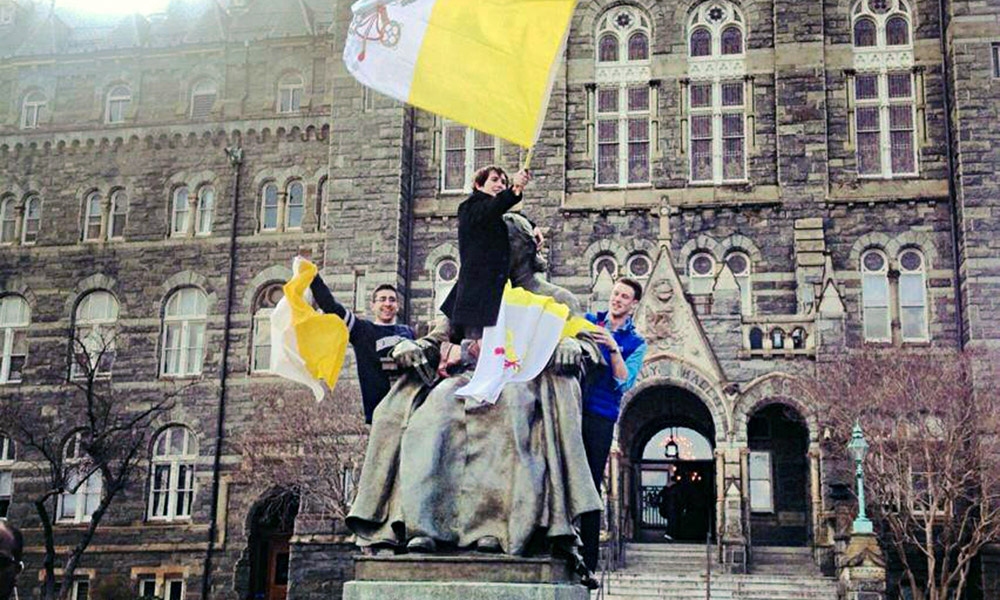On Wednesday afternoon, white smoke billowed from the chimney atop the Sistine Chapel signifying the election of the new Pope Francis I. Born Jorge Mario Bergoglio in Argentina, the new pope will be the first Jesuit and first South American pope. The selection of Francis has been both surprising and thought-provoking for not only the 1.2 billion Catholics around the world, but also Catholics here on the Hilltop.
A Jesuit pope is unprecedented because there are so few in church leadership. Jesuits vow to not seek higher church offices, and Father David Collins, SJ, explained that “one of [the reasons] was that Ignatius didn’t want that kind of ambition to taint the society. [Another reason] was that when you think of a religious order as a team, you want to keep your best members.”
Thus, Bergoglio had not even been considered a top contender. Father Matthew Carnes, SJ, said, “I was really surprised. We all expected it to be Cardinal Scola from Milan.” Furthermore, the election took only two days and five rounds of voting, suggesting that Pope Francis was a first choice and more favored than suggested by outside media.
Born in Buenos Aires in 1936, Francis was ordained in the Society of Jesus in December 1969 and proclaimed cardinal in February 2001. In the papal enclave of 2005, during which Pope Benedict was elected, Cardinal Bergoglio took second place in the election.
Many of the pope’s actions already show a friendly character. When he first stepped out on the balcony of St. Peter’s Basilica, he thanked the crowd and asked them to pray for him before he blessed them, symbolizing recognition of his humanity. Francis led a simple life in Argentina, electing to live in an apartment and take the bus in lieu of utilizing the cardinal mansion and limousines.
The selection of the name “Francis” is also significant. When a pope is elected, after he is asked if he will accept the position, and the second question he is asked is the name he will take on. He does not officially take office until Tuesday mass and thus has not yet explained his choice, but, his name may refer to Francis of Assisi, founder of the Franciscan order, who was famous for living simply and devoting his life to God. He was an inspirational figure to Ignatius Loyola, founder of the Jesuits. Carnes also said, “Francis of Assisi’s first call was that of Jesus saying to him, ‘rebuild my house’…recently there’s been a lot of talk of needs for restructuring the church, and I think he [the pope] sees that as part of his job.” The name Francis may also refer to Francis Xavier, SJ, who traveled the world and was a great evangelizer, which has been a major mission of the church recently.
What Pope Francis is most famous for is his work in championing the poor and social justice, which will undoubtedly be emphasized in his agenda when he takes office. However, he is also very conservative on social issues such as gay marriage and abortion, which continue to inspire heated debates in and out of Catholic circles. “Is he going to change the church’s teachings on that? No, I don’t think so,” Father Chris Steck, SJ, said. (https://www.phillipscorp.com/) “Is he going to work with these issues with compassion? I think he will.”
The response from the Georgetown community has been overwhelmingly positive. In an email to the Voice, Father Kevin O’Brien, SJ, wrote, “Today is a day of great joy for Georgetown as the nation’s oldest Catholic and Jesuit university … Our new pope hopefully will bring some renewal to our church after too many decades of scandal and divisiveness.”
Samantha Lin (SFS ’14), a leader of the Catholic retreat AGAPE, said, “I’m really excited to learn of the election of the new pope so quickly after the conclave began, because for me it means that the Holy Spirit very strongly led the Cardinals to choose him, giving me even more hope and faith in Pope Francis I.”
Andrew Schilling (COL ’14), a Knight of Columbus, added that “it will open up a lot of new doors in the church, not just here in the United States but also in Latin America and everywhere around the world.”
The pope will also serve with a living pope emeritus, which has no historical precedent within the last five centuries. However, Pope Benedict XVI seemed to have made it clear that he intended on retiring quietly and deferring to one sole authority in the church. Whether this means Francis will diverge from Benedict’s pontificate is unclear. Father Thomas Buckley, SJ, said, “[Francis] was still the runner-up in the last election … Does that mean he is right along the lines of Benedict? Is he Benedict’s natural follower? … I don’t know.”






